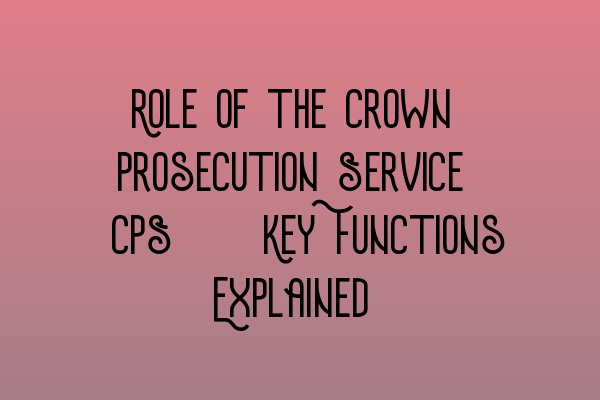Role of the Crown Prosecution Service (CPS): Key Functions Explained
Welcome to the SQE Criminal Law & Practice Law UK blog, where we strive to provide you with informative content on various legal topics. In today’s post, we will be discussing the key functions of the Crown Prosecution Service (CPS) in the UK criminal justice system.
What is the Crown Prosecution Service (CPS)?
The Crown Prosecution Service (CPS) is an independent body responsible for prosecuting criminal cases in England and Wales. It operates under the framework set out in the Prosecution of Offences Act 1985 and works closely with the police to bring cases to court.
The CPS plays a crucial role in ensuring that the criminal justice system operates effectively and fairly. Their primary function is to make decisions on whether to prosecute individuals suspected of committing a criminal offense, ensuring that the evidence against them is sufficient and in line with the Code for Crown Prosecutors.
Key Functions of the Crown Prosecution Service (CPS)
1. Decision-Making: The CPS reviews evidence gathered by the police and makes informed decisions on whether to charge individuals with a criminal offense. This involves assessing the strength of the evidence, the public interest, and the likelihood of a successful prosecution.
2. Preparing Cases for Court: Once a decision to prosecute has been made, the CPS prepares the case to be presented in court. This includes gathering further evidence, liaising with witnesses, and instructing barristers or solicitor-advocates for representation.
3. Presenting Cases in Court: The CPS is responsible for presenting the prosecution’s case in court. They work closely with barristers or solicitor-advocates to present the evidence and arguments to the judge and jury. This involves examining witnesses, presenting key evidence, and making legal submissions.
4. Case Management: The CPS manages the progress of cases throughout the legal process. This includes handling disclosure of evidence to the defense, responding to defense submissions, and ensuring that all necessary paperwork and documentation are in order.
5. Victim Support: The CPS also works to support victims and witnesses throughout the court process, ensuring that they are properly informed, treated with respect, and protected from intimidation or harassment.
Why is the Role of the CPS Important?
The role of the CPS is vital in upholding the principles of justice and ensuring that the guilty are brought to account for their actions. By independently reviewing evidence and making fair decisions on prosecution, the CPS helps maintain public confidence in the criminal justice system.
Effective prosecution ensures that individuals who commit criminal offenses face appropriate legal consequences, deter others from engaging in similar behavior, and ultimately contribute to the protection and safety of society as a whole.
If you’re preparing for the SQE Criminal Law & Practice exam, it’s essential to have a deep understanding of the role of the CPS. For additional resources and practice materials, be sure to check out our related articles:
- SQE 1 Practice Exam Questions
- SQE 1 Practice Mocks FLK1 FLK2
- SQE 2 Preparation Courses
- SQE 1 Preparation Courses
- SRA SQE Exam Dates
By utilizing these resources, you can enhance your knowledge and improve your chances of success in the SQE Criminal Law & Practice exam.
Thank you for reading our blog post on the role of the Crown Prosecution Service (CPS). We hope you found it informative and valuable. If you have any questions or would like to learn more about our SQE preparation courses, please don’t hesitate to contact us.
